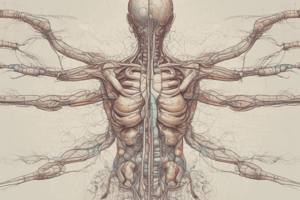Podcast
Questions and Answers
What are the appropriate terms for cholinergic drugs?
What are the appropriate terms for cholinergic drugs?
- Parasympathomimetics (correct)
- Cholinergic agonists (correct)
- Cholinergics (correct)
- Sympathomimetics
What neurotransmitter is primarily responsible for the transmission of nerve impulses in the parasympathetic nervous system?
What neurotransmitter is primarily responsible for the transmission of nerve impulses in the parasympathetic nervous system?
Acetylcholine
Which receptors are types of cholinergic receptors?
Which receptors are types of cholinergic receptors?
- Adrenergic
- Nicotinic (correct)
- Serotonergic
- Muscarinic (correct)
Nicotinic receptors are stimulated by nicotine.
Nicotinic receptors are stimulated by nicotine.
What are cholinergic drugs known for mimicking?
What are cholinergic drugs known for mimicking?
Name the two categories of cholinesterase inhibitors.
Name the two categories of cholinesterase inhibitors.
What is the effect of cholinergic drugs on the pupil?
What is the effect of cholinergic drugs on the pupil?
At recommended dosages, which receptors do cholinergic drugs primarily affect?
At recommended dosages, which receptors do cholinergic drugs primarily affect?
What are some primary contraindications to the use of cholinergic drugs?
What are some primary contraindications to the use of cholinergic drugs?
Flashcards are hidden until you start studying
Study Notes
Cholinergic Drugs Overview
- Cholinergic drugs stimulate the parasympathetic nervous system, opposing the sympathetic nervous system.
- Acetylcholine is the primary neurotransmitter for the parasympathetic nervous system.
- Two types of cholinergic receptors:
- Nicotinic receptors: Located in ganglia of both parasympathetic and sympathetic systems; activated by nicotine.
- Muscarinic receptors: Found postsynaptically in smooth muscle, cardiac muscle, and glands; activated by muscarine from mushrooms.
Pharmacological Functions
- Cholinergic agonists mimic acetylcholine effects by stimulating cholinergic receptors directly or indirectly.
- Direct-acting cholinergic agonists: Bind directly to receptors and activate them.
- Indirect-acting cholinergic agonists (cholinesterase inhibitors): Prevent breakdown of acetylcholine by inhibiting acetylcholinesterase.
- Reversible inhibitors: Bind temporarily to cholinesterase.
- Irreversible inhibitors: Bind permanently, requiring the body to create new enzymes to restore function.
Effects of Cholinergic Drugs
- Stimulation of the parasympathetic nervous system leads to:
- Increased gastric secretions, gastrointestinal motility, and urinary frequency.
- Miosis (pupil constriction) to reduce intraocular pressure.
- Enhanced salivation and sweating.
- Reduced heart rate and vasodilation.
- Bronchoconstriction and narrowed airways.
- Muscarinic receptors are primarily affected at recommended dosages; nicotinic receptors may be stimulated at high dosages, leading to adverse effects.
Clinical Applications
- Direct-acting drugs (e.g., carbachol, pilocarpine, echothiophate):
- Used topically for glaucoma and ocular surgery to lower intraocular pressure.
- Bethanechol: Promotes detrusor muscle contraction in the bladder and enhances GI tract tone and motility.
- Indirect-acting drugs enhance acetylcholine levels for:
- Diagnosing and treating myasthenia gravis.
- Reversing neuromuscular blockade from certain drugs or anticholinergic poisoning.
- Treating Alzheimer's disease, due to low acetylcholine levels.
Contraindications and Adverse Effects
- Contraindications for cholinergic drug use include:
- Known drug allergies, GI or GU tract obstruction, bradycardia, cardiac conduction defects, hyperthyroidism, epilepsy, hypotension, and COPD.
- Adverse effects mainly arise from excess stimulation of the parasympathetic nervous system.
Studying That Suits You
Use AI to generate personalized quizzes and flashcards to suit your learning preferences.




